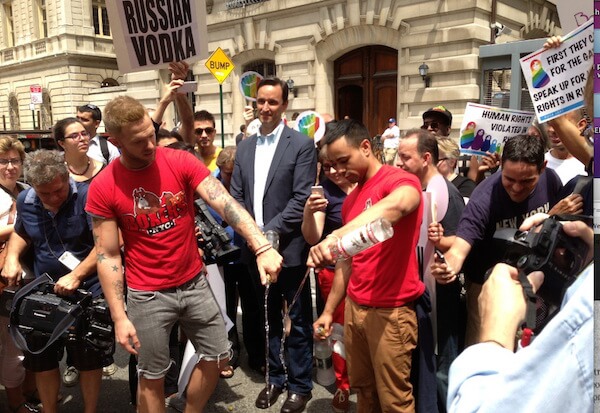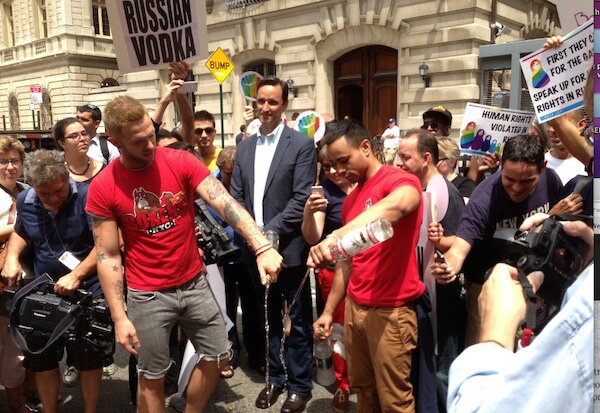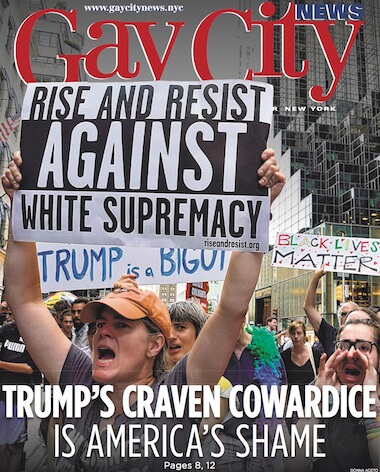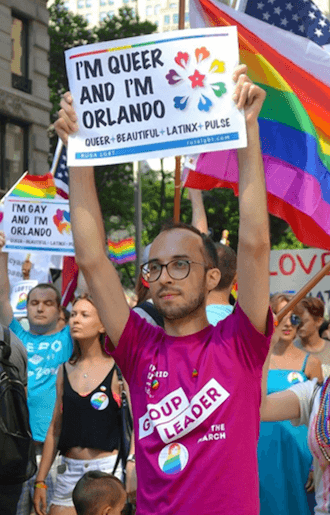Activists join the owner and bartenders from Boxers NYC in dumping Stolichnaya vodka outside the Russian Consulate in Manhattan in July 2013 to protest Vladimir Putin’s enactment of an anti-LGBTQ law. | GAY CITY NEWS
Activists who defended Stolichnaya vodka during a 2013 boycott of Russian businesses and products called after that nation enacted its infamous anti-gay propaganda law may be dismayed to learn that Vladimir Putin agrees with them that the Stolichnaya vodka that is sold in the US is not a Russian vodka.
In 2014, the Russian government gave the trademarks for Stolichnaya to Federal Treasury Enterprise Sojuzplodoimport (FTE), which authorized Moscow Distillery Cristall, a private company, to produce Stolichnaya vodka for sale in the US. The government empowered both entities to sue SPI Group, the private company that currently holds the Stolichnaya trademarks everywhere except in Russia, and get the trademarks back.
FTE and Cristall sued SPI in roughly 30 countries, including in federal court in the US in 2014, accusing the company’s owners, Yuri Shefler and Alexey Oliynik, of effectively stealing the trademarks in the early 90s following the collapse of the Soviet Union and of damaging the Stolichnaya brand by selling an inferior vodka that is made in Latvia.
Kremlin sues, saying vodka sold here isn’t Russian, while US distributor replies, “No so”
“Upon information and belief, in or about 2002, at the direction of Shefler and Oliynik, SPI began exporting vodka into the US under the Stolichnaya Marks that was produced and/ or bottled in Latvia — not Russia, where authentic Stolichnaya brand vodka is produced,” FTE’s lawyers wrote in an amended complaint in the case that was filed last year. “Defendants have imported, advertised, distributed, and sold vodka from Latvia bearing the Stolichnaya Marks in New York and elsewhere in the United States.”
The anti-gay propaganda law effectively barred any positive representations or discussions of the LGBTQ community in Russia. Activists, including this reporter, responded with protests that included dumping Russian vodka in gutters and sewers outside Russian consular offices and calls for a boycott of Russian products. Stolichnaya, which is probably the most recognized Russian brand in the US, and its supporters pushed back, saying that the vodka was Latvian, not Russian.
“Technically, to define it as a Russian vodka in the US, it needs to be produced, bottled, and distilled in Russia,” Marco Ferrari, the chief marketing officer for SPI Group, told RIA Novosti, a Russian government news agency, in a 2013 interview. “Yes, it’s distilled in Russia, but it becomes a vodka in Latvia… Our ingredients are Russian, but technically it’s not a Russian vodka.”
The company has held different positions on Stolichnaya’s Russianness over the years. Responding to FTE’s amended complaint last year, SPI group denied that it was a Latvian vodka, saying it was only bottled there.
“The SPI Defendants admit that, in or about 2002, vodka sold in the United States under the Stolichnaya Marks was produced in Russia and bottled in Latvia,” SPI Group’s lawyers wrote in a counterclaim. “Except as expressly admitted, the SPI Defendants deny the allegations.”
Responding to a 2006 lawsuit brought against Stolichnaya by Russian Standard, a Russian vodka, that alleged SPI was fraudulently marketing Stolichnaya as Russian, SPI wrote, “All Stolichnaya vodkas sold in the United States are therefore now produced in, and exported out of, Russia under different brand names and then shipped for importation to the United States under the Stolichnaya name. SPI Defendants deny the allegation that the vodka produced for export to the United States for sale under the Stolichnaya brand is anything other than genuine Russian vodka.”
SPI conceded that Stolichnaya was “filtered, bottled, and labeled” in Latvia in the Russian Standard lawsuit.
In 2013, the same year that Ferrari said that Stolichnaya was Latvian, Kevin Sniffen, who was working for Stolichnaya’s outside public relations agency, told Forbes magazine, “We understand Stoli is probably the best-known Russian product outside Russia.”
Also in 2013, Stuart Milk, the founder and president of the Harvey Milk Foundation, which has been a beneficiary of events that had Stolichnaya among its sponsors, and LGBTQ activists in Latvia objected to the boycott, saying the vodka was made in Latvia.
FTE’s lawsuit was initially dismissed, but it was revived after FTE appealed. The parties are currently in discovery, with a trial scheduled for next year. Recognizing that it could lose the lawsuit and the trademarks, SPI filed the counterclaim asking that the tens of millions it has spent promoting the brand since the early ‘90s be counted toward any judgment against it or be paid to it.
Stolichnaya began life as a Soviet Union-owned brand in the late 1930s or early ‘40s. The Soviet government won the US Stolichnaya trademarks in 1969. It was consistently sold as an authentic Russian vodka. When the Soviet Union collapsed in 1991 and 1992, Shefler and Oliynik assert that they engaged in a series of legitimate transactions recognized by the government to acquire the brand and its trademarks.
After Putin became Russia’s president in 2000, the government saw the brand’s value and successfully sued in a Russian court to get the Russian trademarks back. SPI no longer sells Stolichnaya in Russia. The government now wants global control of Stolichnaya.
“Officials of the Russian Federation took notice of this success and sought to profit from it,” SPI wrote in its counterclaim. “Shortly after Vladimir Putin became Acting President of Russia in January 2000, these government officials sought to ‘recover’ the Stolichnaya trademarks throughout the world, which they observed to be in private hands.”
The boycott faded after the end of the 2014 Winter Olympics, which were held in Russia. The recent government attacks on gay men in Chechnya, which is part of Russia, have not prompted renewed calls for a boycott of any Russian products.
As the brand, now Stoli in the US, has expanded its sponsorships of LGBTQ community events and groups, there has been little pushback.
Brian Cox, chief marketing officer for Stoli in the US, in an email, acknowledged that the company still sources ingredients in Russia, but asserted, “We are of Russian origin but since we are not now 100% distilled, filtered, and bottled in Russia we do not claim to be Russian Vodka but rather European Vodka. However, we are proud of our brand’s Russian heritage spanning 80 years (since 1938) and even prouder of our commitment to and partnerships with a diverse LGBTQ community.”






































